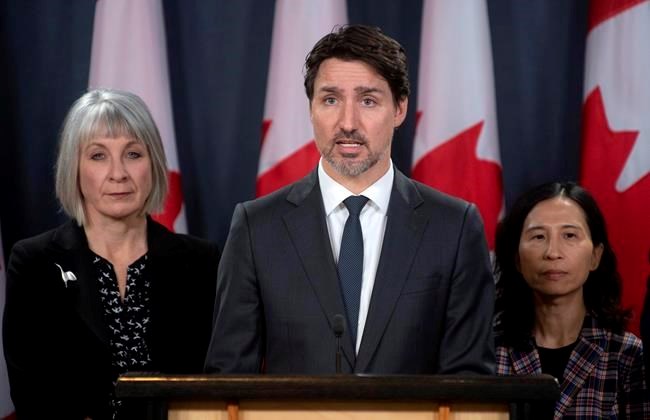WASHINGTON — The glad-handing, confetti-and-skimmer-hat spirit of North American retail politics is on a collision course with the realities of life in a pandemic.
In both Canada and the United States, the cheering partisan crowds and selfie lines, a familiar backdrop for any aspiring leader, are at risk of disappearing as health officials advise against large gatherings, face-to-face human contact and even shaking hands — the lifeblood of any political campaign.
Candidates seeking to replace Andrew Scheer as leader of the federal Conservatives are exploring options for what their leadership campaigns might look like without public events — more livestreaming, telephone town calls and more social media activity.
"We are now in full contingency-planning mode," said Melanie Paradis, a spokesperson for the campaign behind Ontario MP Erin O'Toole, who is competing with Peter MacKay for the party's top job.
Six others are still trying to raise the necessary money and support, and have exactly two weeks to do it — all while keeping one eye on the latest recommendations from public health officials.
"Every single day on a campaign is a new day filled with surprises," said Rita Smith, a spokeswoman for Sarnia-area MP Marilyn Gladu. "This is another element to add to the daily planning."
Stateside, where the race to secure the Democratic nomination for president is rapidly nearing a crescendo, both front-runner Joe Biden and progressive challenger Bernie Sanders cancelled major rallies in Ohio on the very day that primary voters in six states were in the process of casting ballots.
Sunday's televised debate in Phoenix will take place without a studio audience, a format some say could help the former vice-president.
"I think that will favour Joe Biden's style," said Mitchell McKinney, the director of the Political Communication Institute at the University of Missouri. Sanders always seems to feed off the energy of his audiences, while Biden has tended to fade into the background, he said.
"It might turn those negatives into a positive, where he appears more conversational: the softer Joe, caring and reasoned."
Barring a major development, the primary race may already be an academic exercise: Biden extended his lead this week, winning four of the six states on offer, including Michigan, and keeping the race in Washington state too close to call.
"Last night was not a great night for our campaign," a surprisingly frank Sanders acknowledged Wednesday, vowing to remain in the race for now for the sake of his progressive agenda. "We are losing the debate on electability."
Biden, an old-school, touchy-feely grassroots campaigner, could struggle if he can't interact with voters the way he normally would.
"It may provide a competitive disadvantage if your strength is connecting directly with the public," said Capri Cafaro, a former member of the Ohio Senate who now teaches politics at American University in Washington. "It takes a tool off the table for you to be able to connect."
Both campaigns have promised to assess their plans regularly and go day-to-day on whether to press ahead with scheduled events. Late Wednesday, the Biden campaign cancelled planned "large crowd events" in Chicago and Miami, replacing them with virtual events "at the request of elected officials in Illinois and Florida."
Vice-President Mike Pence, meanwhile, refused to be pinned down Tuesday on whether Donald Trump would be curtailing his own schedule of public events and "Keep America Great" rallies, a keystone element of the president's re-election strategy.
"I think that will be a decision that's made literally on a day-to-day basis," Pence said, standing next to a placard displaying public health tips that included avoiding shaking hands and "postponing large meetings or gatherings."
Trump's public health challenge could quickly become a political problem if he chooses to ignore his government's own advice.
"If he's not leading by example, it sends a mixed message to the public that maybe, number 1, there's no need to follow that kind of direction, or number 2, that maybe it's not as serious as people think it is," Cafaro said.
"We do need our federal government to be even-handed and calm in the face of crisis, but I think there is a difference between calm in the face of crisis and absolutely downplaying something to the point that you're sending conflicting messages to the American public."
Nor is the clash between political and practical exclusive to North America's major urban centres or outbreak hotspots.
In New Brunswick, where officials announced their first presumptive case Wednesday, the looming threat is becoming a factor in a province where the opposition Liberals are keen to topple the Conservative government over proposed health-care reforms.
"In everything we're doing today, the coronavirus has to be a consideration," said Premier Blaine Higgs.
That includes whether to force an election, said Green Leader David Coon: "People might not answer the doors when we go knocking."
This report by The Canadian Press was first published March 11, 2020.
— With files from Stephanie Levitz in Ottawa and Kevin Bissett in Fredericton.
James McCarten, The Canadian Press


